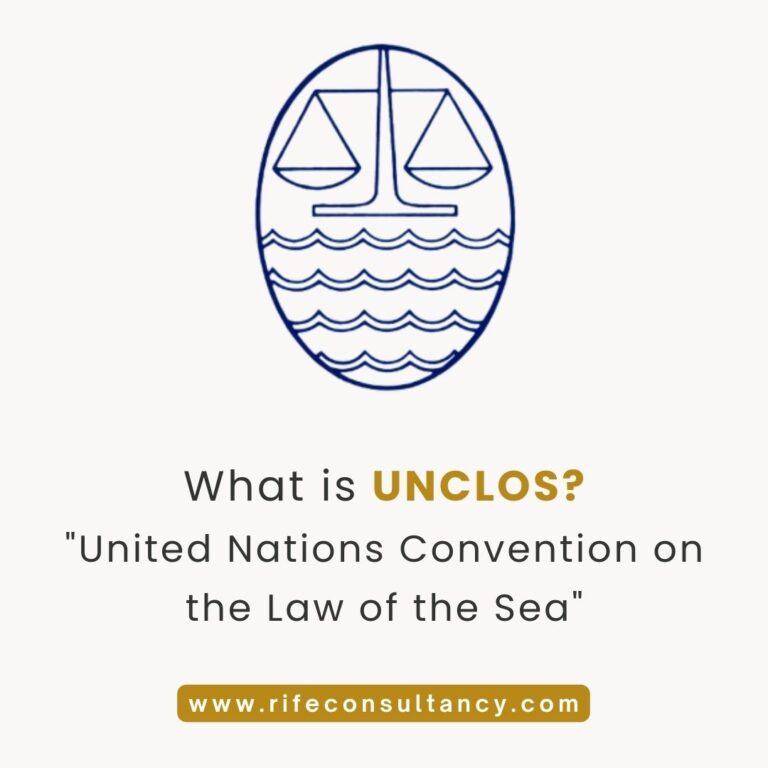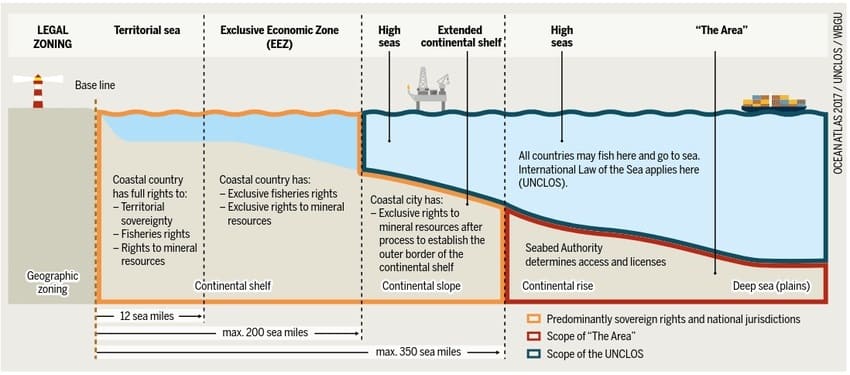
The United Nations Convention on the Law of the Sea (UNCLOS)
Why UNCLOS?
The world’s oceans cover approximately 71% of the Earth’s surface, providing crucial resources and playing a vital role in sustaining life on our planet. The management and regulation of activities in these vast marine spaces are critical to maintaining peace, cooperation, and sustainable use of marine resources. To address these issues and establish a comprehensive legal framework for the world’s oceans, the United Nations Convention on the Law of the Sea (UNCLOS) was adopted. UNCLOS, often referred to as the “constitution for the oceans,” is an international treaty that governs the rights and responsibilities of states concerning the use of the world’s oceans and their resources.
Table of Contents
History and Adoption
UNCLOS was adopted on December 10, 1982, during the Third United Nations Conference on the Law of the Sea in Montego Bay, Jamaica. The convention came into force on November 16, 1994, after it was ratified by 60 states, signifying the importance and broad acceptance of its provisions in the international community. Today, UNCLOS has been ratified by more than 160 countries, making it one of the most widely accepted treaties in history.
Key Objectives
The primary objectives of UNCLOS are to promote the peaceful and equitable use of the oceans and seas, facilitate international cooperation in the management of marine resources, and prevent and resolve disputes related to ocean matters. The convention aims to strike a balance between the interests of coastal states and those of the international community concerning the exploitation and conservation of marine resources.

Key Provisions
- Territorial Seas and Exclusive Economic Zones (EEZs): UNCLOS establishes the concept of territorial seas, extending up to 12 nautical miles from a country’s baseline. Within this zone, coastal states have full sovereignty and jurisdiction. Additionally, UNCLOS introduced the notion of the Exclusive Economic Zone (EEZ), which extends up to 200 nautical miles from a nation’s coast. Within this zone, the coastal state has the exclusive right to explore and exploit natural resources, both living and non-living, in the waters, seabed, and subsoil.
- International Seabed Authority (ISA): UNCLOS created the ISA, an independent international organization, to oversee activities related to the seabed beyond national jurisdiction, known as the “Area.” The ISA’s primary responsibility is to manage and regulate the exploration and exploitation of mineral resources in the Area for the benefit of humankind as a whole.
- Freedom of Navigation: UNCLOS enshrines the principle of freedom of navigation, ensuring that ships of all states enjoy the right of innocent passage through territorial seas, archipelagic waters, and international straits. This provision aims to promote unimpeded maritime trade and transport.
- Environmental Protection and Marine Conservation: The convention emphasizes the obligation of states to protect and preserve the marine environment. States are required to take measures to prevent, reduce, and control pollution, as well as protect endangered marine species and their habitats.
- Settlement of Disputes: UNCLOS provides mechanisms for the peaceful settlement of disputes between states concerning the interpretation and application of the convention. This includes procedures such as negotiation, mediation, arbitration, and the International Tribunal for the Law of the Sea (ITLOS).
Also Read : “Global Maritime India Summit 2023: The Future“
Challenges and Future Outlook
While UNCLOS has achieved significant success in promoting international cooperation and managing ocean resources, it faces several challenges. Issues like illegal, unreported, and unregulated (IUU) fishing, piracy, maritime boundary disputes, and the impact of climate change on the oceans continue to pose significant challenges. Furthermore, as new technologies emerge and human activities expand into deeper waters, new legal and regulatory frameworks may be required.
The future outlook for UNCLOS lies in its effective implementation and adherence by all member states. Continued cooperation and dialogue between nations are essential to address emerging challenges and maintain the sustainable use and conservation of the world’s oceans.
Conclusion
The United Nations Convention on the Law of the Sea (UNCLOS) is a landmark treaty that has provided the international community with a comprehensive legal framework for the governance of the world’s oceans. By defining the rights and responsibilities of states, UNCLOS has contributed to peaceful cooperation, sustainable resource management, and the protection of the marine environment. As challenges persist, it is crucial for all nations to work together and uphold the principles and objectives of UNCLOS to ensure the long-term well-being and prosperity of our global oceans.
Click here to join our Telegram chanel
You will get information, news, and support related to Merchant Navy.
